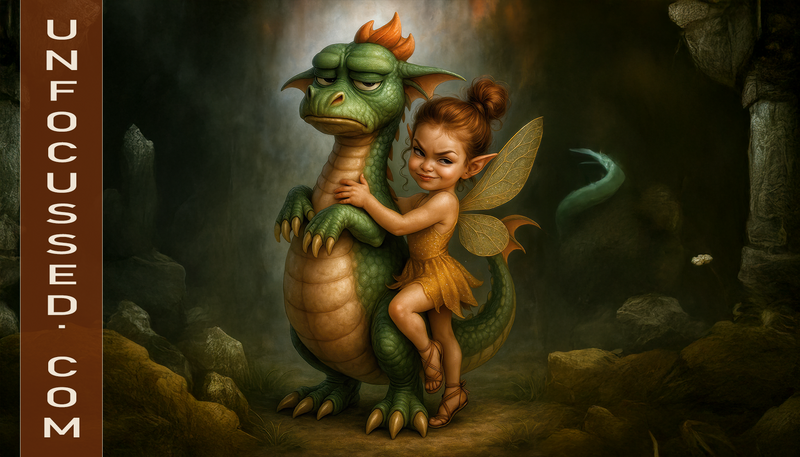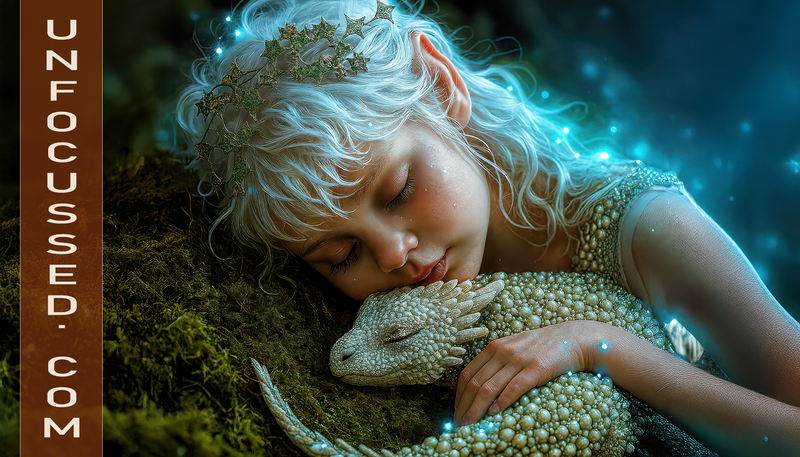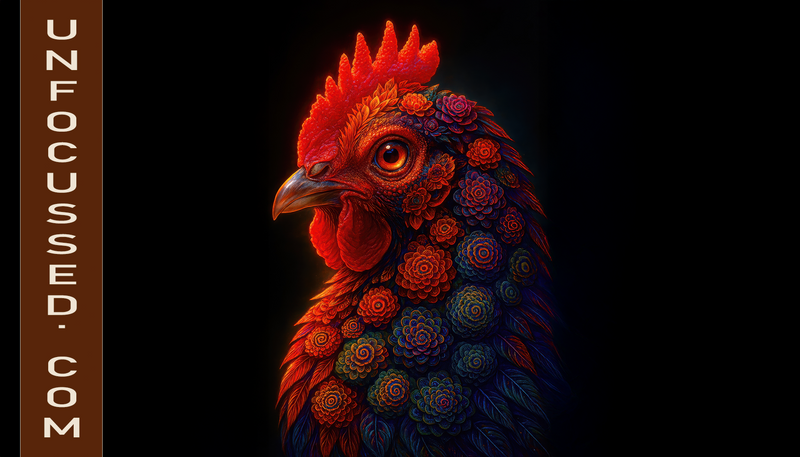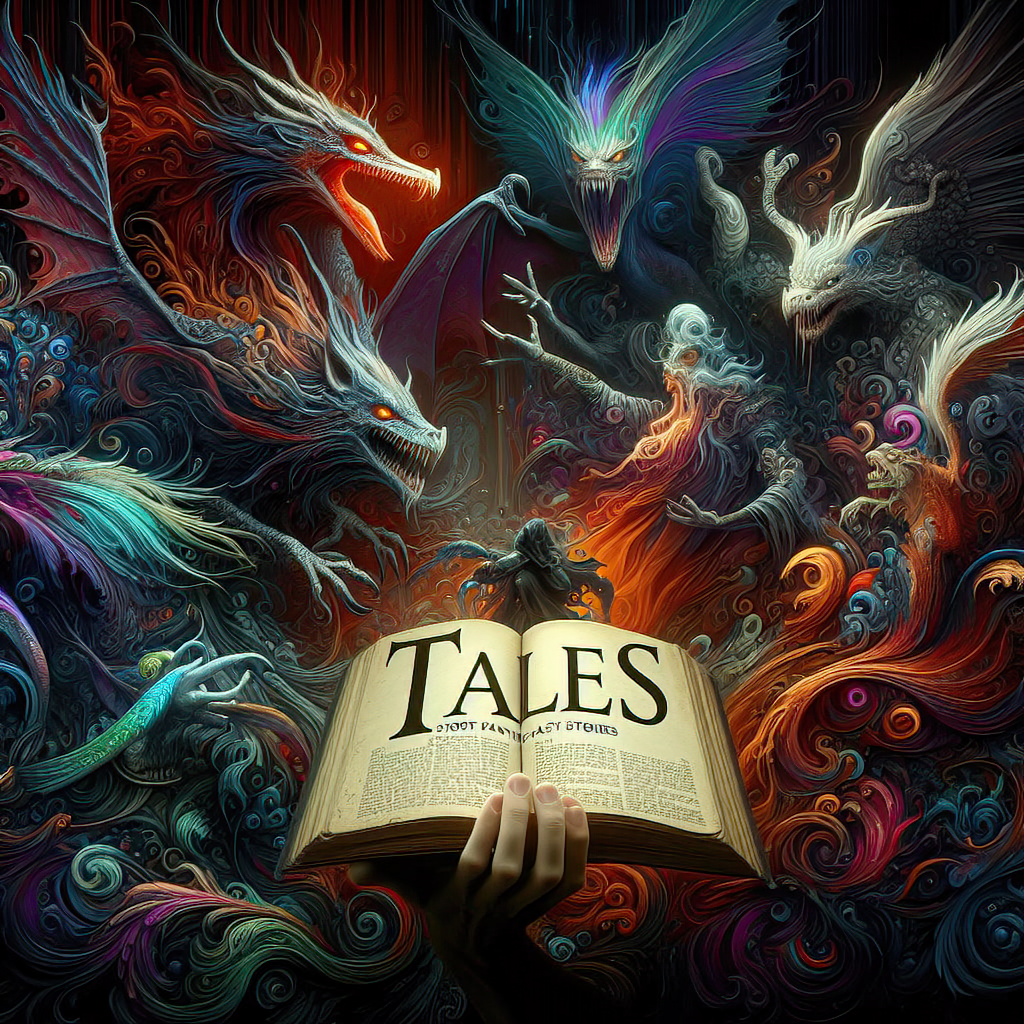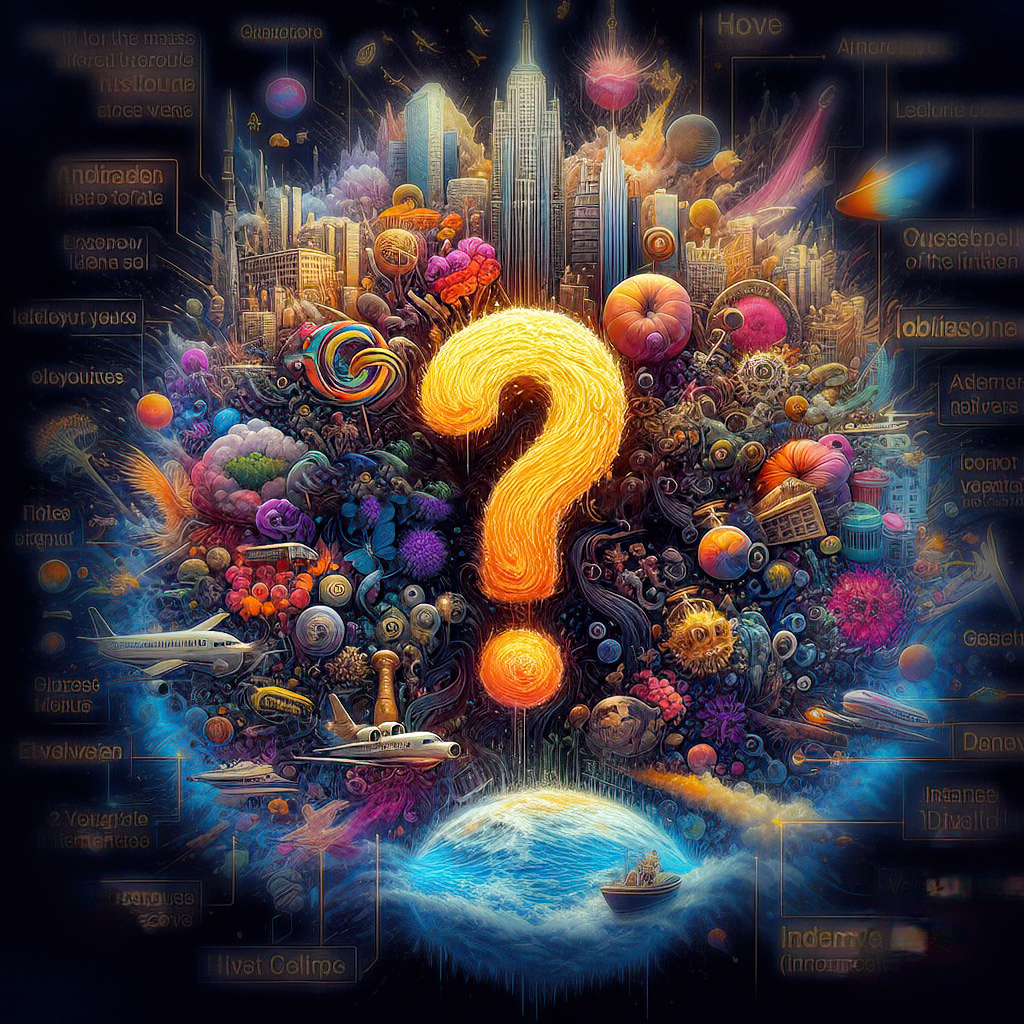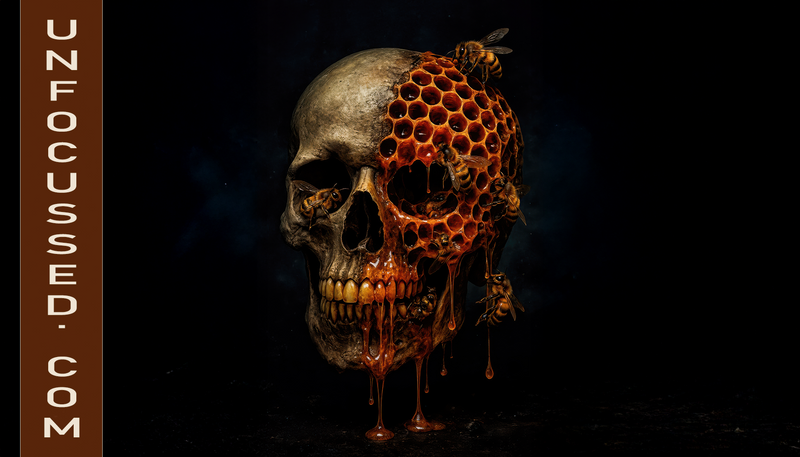
por Bill Tiepelman
The Sweet Decay
The Hive Beneath The smell hit her first—sweet, but wrong. It clung to the air like the scent of a dying flower dipped in syrup and left to rot in the sun. Tamsin had only meant to cut through the woods behind the property, the way she’d done for years as a shortcut home. But something was different today. The trail was quieter, the birds silent, the wind... still. Then the buzzing began. She stopped dead. A low hum, subtle at first, like the prelude to tinnitus. It deepened as she moved forward, until it seemed to vibrate against her skin, crawling down her spine and curling around her bones. And then she saw it—a strange hollow where a tree had once stood. Within that shallow bowl of earth sat something both unnatural and impossible: a human skull, cracked but intact, embedded in a sprawling amber lattice of honeycomb. Bees swarmed it, but not angrily. Not defensively. No—this was reverence. They moved like monks tending to a reliquary, their tiny bodies glinting with golden flecks of syrup. The honey ran slow and thick from the eye sockets and jaw, dripping in obscene slowness into the moss below. And the skull... it wasn’t empty. Behind the honeycomb veil, something blinked. Tamsin staggered back, heart slamming against her ribs like a bird in a cage. She told herself it was a trick of the light. Reflex. Nerves. But even as she turned to run, the image clung to her memory—those bees crawling across teeth still stained with the suggestion of breath, that slow, weeping ooze, and the thing behind the bone, watching her with the patience of something that had waited too long to be found. She made it home in a daze, locking every door and window, as if that could keep it out. But that night, her bedroom was filled with the hum again. Not in her ears—inside her skull. Something small moved beneath her scalp, just above the temple. She scratched at it feverishly until her fingers came away sticky with blood and... something else. Amber. Still warm. And from the darkness outside, in the direction of the woods, came the sound of wings. A Garden of Bone and Honey The morning sun never rose. Or at least, not for Tamsin. She awoke in what she thought was her bed, until she noticed the texture of the sheets — waxy and warm, slightly pliable, as though made from layers of cured beeswax rather than cotton. The hum was louder now, like a thousand tiny violins tuned just off-key. Her tongue tasted of honey and metal. Her eyes fluttered open to find the room no longer her own. The walls had bloomed. Every surface — ceiling, floor, window panes — had sprouted honeycomb. Some dry and pale, like bone turned brittle with time. Others alive with movement and golden with fresh flow. Bees wandered calmly across the contours of furniture now half-consumed by the hive, their fuzzy bodies pulsing with a purpose Tamsin didn’t understand but could feel deep in her marrow. Her dresser was gone. Her nightstand had turned into a pillar of dripping resin. Even the air smelled different — like a fever dream soaked in clover and decay. She stood, or tried to. The floor shifted under her bare feet, slightly sticky, slightly alive. It pulsed once, in rhythm with the buzz in her skull. Her head ached, not with pain but pressure — the sensation of something growing inside. Pushing outward. Thinking thoughts that were not hers. Remembering things she had not lived. She stumbled to the mirror that was no longer glass but now a glossy sheet of translucent wax. And behind it — a figure. Not her reflection. It watched her through a hole bored into the wax, eye dark and sunken, half-covered in a crust of dripping gold. The same skull. The one from the woods. The one that blinked. Its honeycomb mask quivered, a slow exhale of breath that should have been impossible. She turned, gasping — but the room was empty. When she looked back, the wax was just wax. No hole. No watcher. But the hum had grown louder, furious, insistent. It rattled her bones like a tuning fork and made her teeth ache. She dropped to her knees, clutching her head, and screamed — but the sound that came out was wrong. It wasn’t her voice. It was low and ancient and echoing, as if her vocal cords had become a windpipe for something else to speak through. And it spoke a name. A name she did not know. A name she suddenly understood. Melitodes. In that moment, it all came rushing in — memories not her own, harvested like nectar from some ancient, forbidden source. A story encoded in sugar and death, whispered through centuries of bee dances and bone dust. He had once been a man, they told her. A scholar obsessed with the metaphysical properties of bees. Melitodes believed that bees were not mere insects, but celestial archivists, storing the essence of human souls in their hives. That honey was not just food — it was memory. The oldest, purest record of life and death. And that with the right body, the right vessel… those memories could be reborn. He fed himself to them willingly. Buried his flesh in pollen. Let the hive build its cathedral within his skull. Over decades they consumed him, honored him, protected his consciousness in their waxen labyrinth. Until the hive became him, and he became it. And now, they had chosen Tamsin. The hum in her head became speech — not in words, but in ideas so large and alien they scraped against her sanity. They didn’t want her to die. No. That would be far too crude. They wanted her to transform. To join. To let them carve out a place behind her eyes where Melitodes could grow anew. She would not be lost. She would be layered. Grafted. Part of the greater mind. She tried to run, but the room had no exits now — only tunnels, twisting and warm, pulsing with golden light and the soft, soundless footfalls of bees that no longer looked quite like bees. Some had too many legs. Some had human eyes. Some whispered with the lips of her mother. She ran into the tunnels anyway, slipping on honey-slick walls, tearing her nails against sharp wax ridges, deeper and deeper, past combs the size of coffins. She passed one that held a fetus curled tight in sugar amber. Another with a skeletal man locked in a silent scream, golden strings stretched from his open mouth to a cluster of pupae pulsating with breath. They were making something. No — many somethings. She reached a chamber — vast and cathedral-like, echoing with hums that cracked the air. And in the center was the skull. His skull. Melitodes. But larger now. Alive. Bee-things crawling in and out of his mouth. Honey bleeding from the sockets like tears. And a throne of bone beneath him, shaped from a thousand other skulls, each smiling, each still dripping. “You came back,” it said, but not with words. It was a feeling in her spine. A kiss on the inner wall of her brain. “You always come back.” Tamsin collapsed, limbs folding wrong, twitching, trying to scream — but instead she felt her jaw open and something emerge. A bee. Then another. Dozens. They poured from her mouth and eyes, sticky with new memory, their wings slicing air in patterns only the dead could read. She was no longer just Tamsin. She was hive. She was host. She was the garden of bone and honey, tended with eternal care. The Archivist of Amber She drifted in pieces. There was no “Tamsin” anymore, not entirely. She was scattered — a humming awareness spread across thousands of wingbeats. She saw through many eyes now: through the compound gaze of drones moving through honey-lit halls, through the faceted shimmer of queens breathing in waxen birthing thrones, and through the slow, eternal stare of the Skull, who watched everything with patient rot. Time was different here. It pulsed in cycles of brood and decay, of wax built and eaten, of memories harvested like nectar from the dreaming skulls of trespassers. The hive had grown vast, an inverted cathedral beneath the woods, deeper than bones, older than religion. Those who wandered in rarely wandered out. They became part of the archive. Preserved. Rewritten. Filed away inside thick golden cells like footnotes in a grotesque scripture. There was a logic to it, once you stopped resisting. The hive was not cruel — it was sacred. A library of lives. A preservatory of truths too brittle for time. Melitodes had been its first archivist. Tamsin was its latest. Each one selected, reshaped, their thoughts softened and rewired with waxen filaments. Their memories stored in drops of translucent syrup, each one glistening with echoes of laughter, screams, betrayal, birth. All of it trapped forever, protected behind layers of bone and sting. She sat upon the Throne of Recollection now — not alone, but layered in the consciousness of those before. A girl once. A queen now. A buzzing intelligence wrapped in meat and memory. The drones obeyed. The queens sang to her through their mandibles. The larvae pulsed in rhythm to her thoughts. And in the world above, the forest began to change. It started subtly. Trees wept sap from their bark — but it wasn’t sap. It was honey. Sweet and unnatural. Birds stopped singing. Instead, they buzzed. People who walked the trails began to lose time. To wake with small punctures in their skin. To find strange phrases scrawled in honey on their bedroom walls: “Archive Accepts.” There was an incident — a man found in a park, face contorted in ecstasy, or agony. Hard to tell. His mouth stuffed with wax. Bees flew from his throat when they tried to resuscitate him. The footage was buried, deemed a hoax. But the hive knew. It watched. It remembered. Eventually, it began to reach further. Bees with human eyes landed on playgrounds. Honey with teeth was found in jars that no one remembered buying. Choirs of whispering wings began to murmur in city streets, telling ancient truths beneath the buzz of streetlamps. People dreamed of the skull — always the skull — staring through honeycomb veils, and always the message: “Join us. Be remembered.” Then came the pilgrims. Drawn by instinct, by dreams, by something older than language. They came barefoot through the forest, covered in stings and sweat. They came with offerings: teeth in jars, melted candles, skulls of roadkill animals painted in gold. The hive welcomed them. Wrapped them in warmth and buzz. Dripped memory into their mouths like holy wine. And they gave themselves freely — not in sacrifice, but in archive. By then, Tamsin had become something else entirely. She no longer resembled the girl who once ran through the woods. Her form now was that of a living reliquary: ribs hollowed into combs, heart beating in slow pulses of syrup, eyes leaking honey with each blink. Her voice, when she used it, echoed like bees inside a bell. She rarely spoke aloud — most things could be said with scent and sting. Her tongue had become a map of lives. She tasted thoughts. She whispered truths into drones who carried them to the flowers, the trees, the roots beneath every house built too close to nature. And still the hive grew. As it must. Because death, too, must be remembered. One day, a child wandered too close. A girl with freckles and a jar, chasing butterflies. She stumbled upon the edge of the hive — an old, blackened tree where no birds sang. Inside its cracked bark, she saw something shimmer. Something golden. Something calling her name. She reached inside. And the honey touched her skin like breath. The hum began again. Somewhere below, the Skull turned slowly toward her. It had waited. And it was patient. The archive would have another chapter. And it would be sweet. Long after the last drone settles, the archive endures — eternal, golden, and just beneath the surface of everything we thought we understood. And now, for those drawn to the strange beauty of entropy, you can take a fragment of that forgotten hive home with you. “The Sweet Decay” is now available in select artifact forms: Metal Print — sleek, sharp, and disturbingly elegant, like a shrine to the hive itself. Framed Print — a relic preserved in glass and wood, perfect for dark libraries or haunted hallways. Tote Bag — carry your secrets, bones, or groceries with style and subtle menace. Spiral Notebook — record your dreams, your decay, or the hum of something ancient beneath your thoughts. Each piece is a vessel — a keepsake from the hive beneath. Disturbingly beautiful. Unforgettably strange. Just the way the archive intended.



